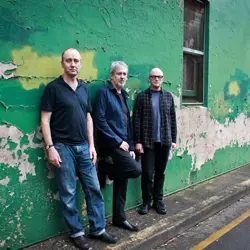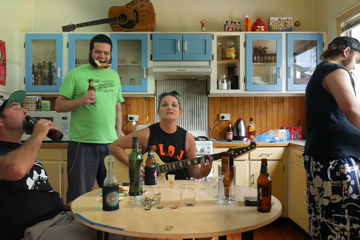 The Necks
The Necks"The role of the audience is very subtle; it's almost subliminal,” Swanton begins. “Like, how much influence can a silent room of people really have? But over the years, it's an interesting thing; in some ways I feel like a member of the audience when I perform with The Necks, and I suspect in some ways the audience feel like they're members of the band. It's a very immersive and participatory kind of thing. Even though the audience is essentially sitting there in silence, I think they really feel like they're included in the performance, because they know that we know as little about where the piece is going to go as they do.
“The sound of the room has a huge effect. I mean I'd go so far as to say that one of the major tasks that we perform on stage is sounding out the room in an artful sense. We're actually sending out audio signals to the space and working with what comes back. And that can sometimes literally be an echo, or it can just be the size of certain notes, or the overtones that are created when one person's notes collide with another in the particular room.
“I think aesthetically I have a slight preference for emptiness over the other two, who love density, although they're certainly not blind to the charms of emptiness. Maybe [it's] because the instrument I play can't actually contribute the same sort of density, because that just gets physically exhausting, trying to match Chris [Abrahams – piano] and Tony [Buck – drums, percussion and triggers],” Swanton admits, laughing. “I can state, as the bass player, that whatever theme it is that I'm pursuing, sometimes just cutting that note off a fraction of a second early will leave this huge, almost shocking, hole in the music, and all I've done is just cut a note a little bit shorter, and I find that very exciting. I love the way that we can develop a texture in the early stages of a piece; it starts to build and then suddenly one of us can choose to create a giant hole, where everything seemed to be happily chugging along.
“Chris has sort of evolved a theory recently that what we do isn't really repetition. Each time it's subtly different and it's [important] to distinguish from the composed minimalists where repetition is very much a part and it's a very controlled situation. Yes we are repeating things, but as soon as a change occurs, it gives a whole different perspective to what that repetition was about. We, all three of us, are a product of our limitations. We're not such consummate musicians that we can endlessly quote ourselves at will anyway. If I tried to quote myself from a previous night, I'd probably get it wrong,” Swanton laughs again, “which is maybe better in the long run anyway, more interesting.”
Don't miss a beat with our FREE daily newsletter















